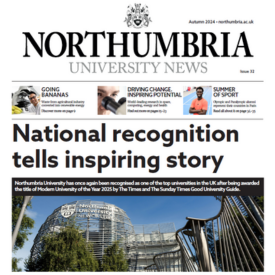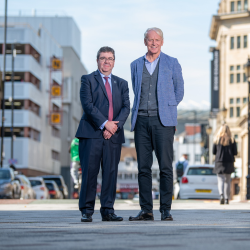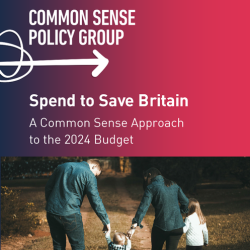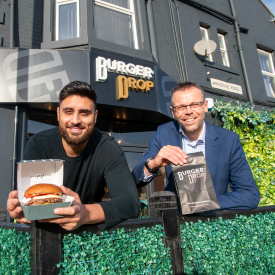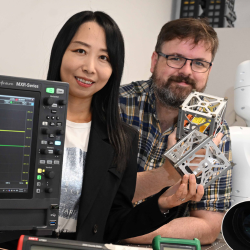-
Study
-
Undergraduate
- Search for a Course
- Undergraduate Open Day & Events
- Application Guides
- Northumbria University UCAS Exhibitions
- Foundation Years
- Undergraduate Fees & Funding
- School & College Outreach
- Continuing Professional Development
-
Postgraduate
- Postgraduate Study Degree
- Postgraduate Research Degrees
- Postgraduate Open Days and Events
- Postgraduate Fees & Funding
- Flexible Learning
- Thinking about a Masters?
- Continuing Professional Development
- Change Direction
-
Student Life
- The Hub - Student Blog
- Accommodation
- Life in Newcastle
- Support for Students
- Careers
- Information for Parents
- Students' Union
- Northumbria Sport
- Be Part of It
-
-
International
International
Northumbria’s global footprint touches every continent across the world, through our global partnerships across 17 institutions in 10 countries, to our 277,000 strong alumni community and 150 recruitment partners – we prepare our students for the challenges of tomorrow. Discover more about how to join Northumbria’s global family or our partnerships.
View our Global Footprint-
Applying to Northumbria
- European Union
- Our London Campus
- Northumbria Pathway
- International Events
- Entry Requirements and Country Representatives
- Regional Offices
-
Northumbria Language Centre
- Faculty Requirements
- Acceptable English Requirements
- Pre-sessional English Language and Study Skills
- Academic Language Skills Programmes (ALS)
-
International Fees, Funding & Scholarships
- International Undergraduate Fees
- International Undergraduate Funding
- International Masters Fees
- International Masters Funding
- International Postgraduate Research Fees
- International Postgraduate Research Funding
- International Money Matters
-
Life at Northumbria
- International student support
- Careers
-
International Mobility
- Current Northumbria Students
- Incoming Exchange Students
-
-
Business
Business
The world is changing faster than ever before. The future is there to be won by organisations who find ways to turn today's possibilities into tomorrows competitive edge. In a connected world, collaboration can be the key to success.
More on our Business Services -
Research
Research
Northumbria is a research-rich, business-focused, professional university with a global reputation for academic quality. We conduct ground-breaking research that is responsive to the science & technology, health & well being, economic and social and arts & cultural needs for the communities
Discover more about our Research -
About Us
-
About Northumbria
- Our Strategy
- Our Staff
- Place and Partnerships
- Student Profiles
- Alumni Profiles
- Leadership & Governance
- Academic Departments
- University Services
- History of Northumbria
- Contact us
- Online Shop
-
-
Alumni
Alumni
Northumbria University is renowned for the calibre of its business-ready graduates. Our alumni network has over 244,000 graduates based in 178 countries worldwide in a range of sectors, our alumni are making a real impact on the world.
Our Alumni - Work For Us
What will I learn on this module?
In a landscape of ubiquitous media platforms and fragmented viewing habits, how can traditional media content be reconfigured to take advantage of the potential for transmedia?
The 360 degree commissioning process is now an accepted part of the media production landscape. Films and TV programmes exist in traditional forms, but they also extend their range and interact with audiences across multiple platforms, screens and formats. Practitioners need to become aware of the transmedia landscape, as well as the strategies and techniques used for adding value and resonance to their content and story ideas across multi-platforms.
‘Storyworlds’ aims to explore the place of transmedia as a marketing opportunity in non-traditional media locations, as a narrative tool to expand the core content’s story universe, and as a way to engage with the concept of ‘the never ending story’ that is characteristic of transmedia production.
You will learn how to develop your own transmedia portfolio for a practical project of your choice, as well as engaging in discussions about the potentials of web and mobile content. You will learn techniques for expanding the narrative universe of your core content across wider platforms.
How will I learn on this module?
You will learn about the subject by attending lectures and seminars, with Storyworld surgeries to help make your project ideas really take advantage of new approaches to storytelling across multiple platforms. The lectures will enable the tutor to discuss the key components of Storyworlds in this context, and reflect upon the core issues and themes of the module.
Each of you will develop your own project portfolio in response to the module materials, which will take the form of a ‘transmedia portfolio’ for a live existing project of your own choice. This project work will be discussed in the seminars and surgeries.
Taught sessions are structured to reflect the core issues and themes of the module. Your tutor will frame the content of each session and outline the aim and outcomes. Tutors begin the sessions by outlining clear parameters, defining the considerations that will enable you to develop your practical work while also developing a critical understanding of principles needed to deliver effective productions. Every module is underpinned by a strong conceptual foundation. The module aims to help you to develop your skills by applying those critical concepts to your own practice. The sessions help to guide you through that development by offering formative feedback as you work through the materials and processes. Guided project work creates an experiential environment on which tutors offer insight.
Outside of the taught sessions, you will be expected to engage with module-relevant reading in preparation for the sessions. An electronic reading list is supplied via the e-Learning Portal, which will guide you towards appropriate resources, although you are encouraged to explore the wider library catalogue to engage with additional sources too. During your independent working time, it is also expected that you will apply the ideas raised in the reading and the taught content to film examples of your own choosing (reflecting your individual interests), and to your own practice. Lecture materials, seminar guidelines and module information will be placed upon the eLearning Portal.
How will I be supported academically on this module?
Storyworlds explodes traditional single screen stories across multiple platforms and the lectures provide a broad basis for articulating the best transmedia approaches and in the seminars each lecture is further exploded and reconfigured creating space for discussion of the form and the ideas for the transmedia portfolios. The scheduled surgeries are designed specifically to address the minutiae of individual proposals.
We support your learning by providing on-going feedback (Formative and Summative) through the range of teaching and learning approaches offered. We ask you to submit your work electronically, and we will supply feedback via Turnitin. You will be able to compare your feedback across modules so that you can assess your development as you progress through the programme.
Formative assessment is offered throughout the module, and summative assignments will receive written feedback within 20 working days of assignment submission. Every tutor has set weekly feedback and tutorial drop in hours, wherein you can seek advice on your academic progress.
Where appropriate you may also be directed to engage with our Skills Plus or other resources offered through the University Student Support Services such as Dyslexia Support. Guidance tutorials also provide opportunities for students to discuss, in confidence, their academic progress on the programme.
What will I be expected to read on this module?
All modules at Northumbria include a range of reading materials that students are expected to engage with. Online reading lists (provided after enrolment) give you access to your reading material for your modules. The Library works in partnership with your module tutors to ensure you have access to the material that you need.
What will I be expected to achieve?
Knowledge & Understanding:
1. Demonstrate an understanding of the key components that make up transmedia storytelling and the principles of the spreadable ‘storyworld’.
Intellectual / Professional skills & abilities:
2. Demonstrate how the creative and critical contexts underpin practice in the production of the transmedia project
3. Evidence creativity and imagination in the deployment of your storyworld, with appropriate use and understanding of multiple platforms.
Personal Values Attributes (Global / Cultural awareness, Ethics, Curiosity) (PVA):
4. Demonstrate awareness of the ethical differences between creating traditional single screen content and transmedia content.
How will I be assessed?
You will receive formative feedback during the seminars throughout the module as you conduct analysis of case studies, allowing you to understand how your analytical skills and grasp of the subject are developing.
You will also receive feedback on your ability to conduct analysis of transmedia storyworlds during the seminars. This will test your ability to critically engage with the principles of effective multiplatform production in an academic and practical fashion, and this will allow you to demonstrate your understanding of the theoretical concepts raised in the lectures and the readings. Class debates in seminars will also be used to assess your understanding of the week’s topic.
You will be summatively assessed by producing an individual transmedia storyworld portfolio that will be equivalent to 3000 words addressing all MLOs.
The portfolio will contain one transmedia project (defined here as a folio of appropriate short treatments with at least one of the treatments demonstrated in a practical realised extract) addressing MLOs 1, 2 & 3.
These relevant multiplatform extensions of the creative core content source material are chosen by you in order to show your understanding of the concepts of the module as well as developing creative skills in the subject area addressing MLO 3.
The subject source material can be any creative core content from the practical modules that you have contributed to, but the emphasis should be on the most recent and concurrent practical work, if appropriate addressing MLO 3.
The components of the portfolio will be: conceptual idea and how it was formulated, transmedia ‘bible’ considerations and one key multiplatform extension in more detail in practice.
The portfolio will also contain a reflexive section that demonstrates the use of principles drawn from the module reading list and which provides a critical and informed foundation for the project - MLOs 2 & 4.
You will receive written feedback on your final summative submissions which will detail areas of your methodological practice, critical and creative skills, and communicative ability that could be improved in future work. You will also be offered the opportunity to receive further verbal feedback following this formal assessment, so that you can follow up any concerns they have regarding their critical development and future learning.
Pre-requisite(s)
none
Co-requisite(s)
none
Module abstract
Storyworlds offers new ways of expanding your creative content across multiple platforms, in a media landscape characterised by ubiquitous screens and fragmented viewing habits. Stories do not just exist in traditional film contexts; audiences interact with stories across multiple platforms. This module will explore that landscape, and its implications for filmmaking practice. In a subject driven by the tutor’s own research interests and practice, you’ll learn about the place of modern myth making, the pleasures of new media and the importance of fan culture. You will deliver a transmedia story world project creatively expanding on your core content by reconstructing film ideas into new, innovative shapes.
Students say Storyworlds is an eye opening development that transcends its marketing roots, as it prepares you for a whole new set of filmmaking opportunities.
Course info
UCAS Code P310
Credits 20
Level of Study Undergraduate
Mode of Study 3 years Full Time or 4 years with a placement (sandwich)/study abroad
Department Arts
Location City Campus, Northumbria University
City Newcastle
All information is accurate at the time of sharing.
Full time Courses are primarily delivered via on-campus face to face learning but could include elements of online learning. Most courses run as planned and as promoted on our website and via our marketing materials, but if there are any substantial changes (as determined by the Competition and Markets Authority) to a course or there is the potential that course may be withdrawn, we will notify all affected applicants as soon as possible with advice and guidance regarding their options. It is also important to be aware that optional modules listed on course pages may be subject to change depending on uptake numbers each year.
Contact time is subject to increase or decrease in line with possible restrictions imposed by the government or the University in the interest of maintaining the health and safety and wellbeing of students, staff, and visitors if this is deemed necessary in future.
Useful Links
Find out about our distinctive approach at
www.northumbria.ac.uk/exp
Admissions Terms and Conditions
northumbria.ac.uk/terms
Fees and Funding
northumbria.ac.uk/fees
Admissions Policy
northumbria.ac.uk/adpolicy
Admissions Complaints Policy
northumbria.ac.uk/complaints





